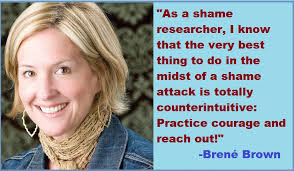This blog was adapted from the webinar discussion presented by Clementine Briarcliff Manor Clinical Director, Danielle Small, MS, LMFT. Danielle Small is a licensed marriage and family therapist with extensive experience in the treatment of Anorexia Nervosa, Bulimia Nervosa, Binge Eating Disorder and compulsive over-exercise. She currently oversees Clementine’s adolescent residential program at Briarcliff Manor, a unique residential eating disorder treatment program exclusively for adolescent girls, between the ages of 12 to 17. To learn more about Danielle and the work being done at Clementine Briarcliff Manor, click here: https://bit.ly/32HLTVE. The unspoken message to parents of kids with eating disorders has long been, “You’ve done enough damage already, please get out of the way.”
There are so many layers to a discussion on shame and as Brené Brown has highlighted, people don’t want to talk about it. This article will focus on how to support without adding shame to our loved one or our own sweet selves. When parenting a “child” with an eating disorder one needs to deal with one’s own shame and guilt as well as that of our “child” who may be an adult. Coping with the messages we get about the mistakes we’ve made in our parenting takes some real conscious effort to delineate between “guilt” which is feeling badly about a mistake we made vs “shame’ which is feeling we are intrinsically bad for a mistake we made. Then there is the learning on how to communicate with our nutritionally deprived loved-one who may hear everything through the filter of shame. Which can add more guilt and/or shame when we make mistakes, which we absolutely will do. We need to be gentle with ourselves and (you know it’s coming if you know me…) SELF-CARE. It’s not just me pushing the self-care. This past Wednesday on the Online Weekly Group Support call I lead we had the Clinical Director from Clementine’s Briarcliff Manor, NY lead us in a discussion on shame. What would you add to this list of tips that came out of our call? 10 Tips on Shame for Effective Eating Disorder Caregivers:
Learning how to do this is a form of self-care. So is going for a walk or talking with a friend. And being gentle with your sweet self is necessary
As we push our loved-one’s towards healthy risks in communication we help them shift their perspective. It takes vulnerability on our part and theirs which helps them get outside of the ed self. It won’t be perfect. And that is okay. If you’d like to talk more about how to practice these skills, give me a call and we’ll talk about it. Without shame. 🙂 Take care,
______________________________ TREATMENT CENTERS & Non-Profits: Ask about special rates on bulk orders of the H.U.G. Kits to share with your families so they are less distressed. They’re READY finally! |
| Thank you to the generous sponsors of Hope Network, LLC Services and Programs for renewing your sponsorships! Ask how your Center can be a sponsor and/or contract for services! |
| Monte Nido and Affiliates
Monte Nido & Affiliates includes three distinct eating disorder treatment What binds us together is our vast overlap in mission and philosophical approaches to providing best-in-class, evidence-based treatment for eating disorders – from a medical, psychiatric, therapeutic and nutritional perspective. We are committed to being Monte Nido has established itself as the clinical leader in the eating disorder field being widely recognized for achieving superior clinical outcomes that show the highest levels of recovery through our peer-reviewed and published residential facility outcome study. In this study, the vast majority of patients demonstrated significant changes in symptoms and behaviors from admission to discharge, and maintained that improvement throughout the course of the study. Our residential programs are located in Southern California, Oregon, New York, South Florida and Massachusetts, with day treatment programs offering partial hospitalization and intensive outpatient programming in Los Angeles, San Diego and Newport Beach, CA; Portland and Eugene, OR; Boston, MA; Miami, FL; New York, NY; and Philadelphia, PA. |

 Most people in the field would now say in 2019 that this is an antiquated, out-dated, harmful and inaccurate message. Most. AND, still the underlying message far too many families are hearing is that they have done something wrong.
Most people in the field would now say in 2019 that this is an antiquated, out-dated, harmful and inaccurate message. Most. AND, still the underlying message far too many families are hearing is that they have done something wrong.

